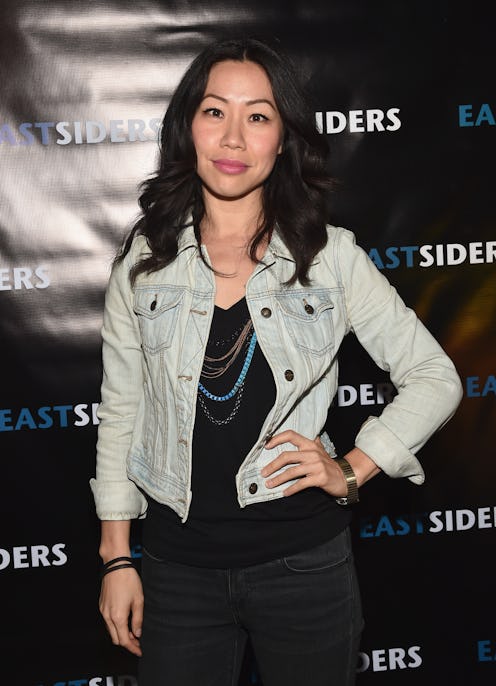Entertainment
Asian American Filmmaker Vera Miao Hates The Word "Diversity"

Vera Miao is a badass. I can only image she's the kind of girl other girls want to be around — and flat-out be. Miao, who started in Hollywood as an actor, now takes on another calling: directing. A little background: She's an Asian American filmmaker with immigrant parents and she also identifies as queer. It's safe to say the Hollywood odds aren't exactly in her favor. Still, Miao, a true lover of storytelling, works tirelessly to get others like her on screen and behind the scenes. Her latest endeavor is the horror anthology series Two Sentence Horror Stories, premiering at Tribeca Film Festival's "N.O.W.: Out of this World: Female Filmmakers in Genre" on April 29. In the series (which she wrote, produced, and directed), her mission is pretty clear.
Think American Horror Story meets Black Mirror meets Get Out (all of which she was inspired by), but starring women of color and Chinese-speaking immigrants. Miao, who's hopeful there's been a "crack" in equal representation on screen, hopes to break it open even more. She refers to the overwhelming lack of representation as "gravity." Hollywood's gravity is working against her and Asians as a whole. "In this country, we are neither black nor white," she tells me on the phone. "Therefore, we sit outside of the dominant paradigm and how we think about people and race."
She continues: "There’s this tremendous and really encouraging moment of time that we’re in… black excellence is everywhere. I love it," she says. "These incredible artists out here [are] breaking barriers." But as she says, unfortunately very few are Asian. "The way that racism manifests with Asians is actually around invisibility." That's the main source of gravity for people like Miao. She admits that she didn't realize how big her hurdles as an artist would be when she first started out. "I was pretty naive," she says. But she's seen the reality, and now she fights.
Her commitment is to always "centralize people of color." This isn't to be confused with "diversify." She says: "I’m going to be honest with you, I hate the term diversity," she tells me. "I think it’s really empty because diversity feels aesthetic and surfaced than actually shifting the gaze and point of view." Miao's ability to centralize such characters gives otherwise unseen faces and voices a stage.
"It’s profound to treat people we never really see on screen as fully-realized, complex, three-dimensional characters who live in a context," she explains. "All I have to do is that and I feel like I’m already contributing." Although her work isn't autobiographical, it comes from experiences and a viewpoint she understands — namely being an Asian American citizen of immigrant parents. And a profound Asian American viewpoint is an extreme rarity in Hollywood.
"Overall, I would say there are very few portrayals of Asians in Hollywood," she says. I ask Miao for her thoughts on tired Asian stereotypes on screen, and it's hard for her to even come up with any. "Asians populate the background... They will be the administrative person, the secretary.... working in the labs... the doctors running around," she says.
She explains that if Asians aren't one-dimensional background characters, they're portrayed as archetypes. "Women are beautiful and probably killers, cold, fierce, aggressive. Or, they’re girlfriends, typically, of white folks. On the men’s side, they’re desexualized, really kind of nerdy, academic types, who work in doctor/lawyer positions," she says.
Miao's understandably had enough. "Those characters are barely actual people who have dreams and hopes and aspirations and fears... Lead characters are the ones who get the fully-realized arc and the dimension," she says. But she tries not to complain. "It’s slow-going, but you have to celebrate every victory and progress," she says. Instead, she lets her work do the talking.